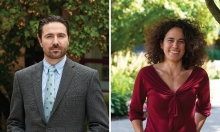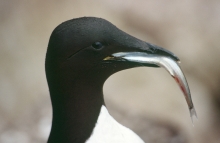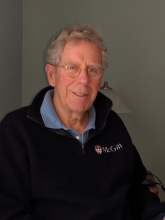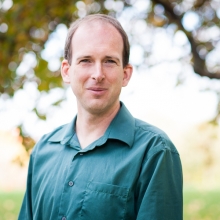Researchers demonstrate for the first time the potential of existing technology to directly detect and characterize life on Mars and other planets. The study, published in Frontiers in Microbiology, used miniaturized scientific instruments and new microbiology techniques to identify and examine microorganisms in the Canadian high Arctic - one of the closest analogs to Mars on Earth. By avoiding delays that come with having to return samples to a laboratory for analysis, the methodology could also be used on Earth to detect and identify pathogens during epidemics in remote areas.
Researchers from McGill University (Paul Thomassin) found that if Canadians ate less meat, and more fruits and vegetables, Canada's GDP would benefit. The authors recommended the government subsidize fruits and vegetables, and tax meat, in an effort to reduce chronic disease.

Congratulations to Jan Adamowski (Bioresource Engineering) and Elena Bennett (Natural Resource Sciences) on their induction into the Royal Society of Canada. The announcement was made in September, and the induction ceremony was held in late November.
CITATIONS:

For 47 years, biologists have plucked eggs from seabird nests along the British Columbia coast. Many of the eggs were collected from remote rocky islands surrounded by some of the world’s roughest seas.
In all, they collected 537 eggs from six species, including ancient murrelets, rhinoceros auklets and double-crested cormorants. Now these eggs are revealing new information about the way mercury finds its way into the ecosystem.

Un décès sur six lui est attribuable chaque année […] « C’est la première fois que l’on conclut que la pollution environnementale est une cause si importante de décès », souligne le professeur Niladri Basu, chercheur à l’Université McGill, qui a participé à l’étude publiée hier par la revue Lancet en partenariat avec l’Organisation des Nations Unies (ONU).

Unseasonably warm September could be cause of slight delay in leaves changing colour, McGill professor says. According to Jim Fyles, a forest ecology professor and director of the Morgan Arboretum, our city's trees have remained green a bit longer due to higher-than-average temperatures.

Situé sur le campus MacDonald de l'Université McGill à Sainte-Anne-de-Bellevue, à la pointe ouest de l'île de Montréal, l'arboretum Morgan, une réserve arboricole et écologique de 245 hectares, propose une panoplie d'activités pour régénérer le corps, éveiller les esprits fatigués et intéresser les néophytes curieux tout autant que les connaisseurs à l'écosystème de la forêt et à son formidable réseau d'échange.

It is with great sadness that we inform you of the passing of Terry Wheeler, Associate Professor in the Department of Natural Resource Sciences.
Professor Wheeler was an expert in entomology and Director of the Lyman Entomological Museum. He had been a faculty member since January 1, 1995.
He lost his battle with cancer which he had taken in stride and fought with amazing optimism. Professor Wheeler will be terribly missed.
Read more...
Judith Largy-Nadeau (BRE) and Dainava Blayney (NRS) and students from the Université de Sherbrooke are going door-to-door in Pointe-Claire to promote good waste habits this summer.
“It has been something of a mystery why predators are so important in animal extinctions,” says Kyle Elliott, an assistant professor in McGill University’s Dept. of Natural Resource Sciences and the first author of a recent study on the subject published in the Proceedings of the Royal Society B. “As prey populations decline, predators should simply switch to other prey.

Professor Peter G. Brown (Natural Resource Sciences) has been selected as the recipient of the US Society for Ecological Economics 2017 Herman Daly Award for outstanding contributions to the field of ecological economics.

Marianne Falardeau-Côté, a PHD candidate in Natural Resource Sciences with Professor Elena Bennett and the recipient of the 2017 Laure Waridel Bursary, shares her experiences in Scandinavia.

The World Economic Forum announced its 2017 class of 55 Young Scientists, assembling a distinguished cohort of top talent making an impact on research as diverse as quantum and computer science, physics and materials science, biology and bio-engineering, medical and neuroscience, and energy and environment. Collectively, their research is at the core of the Fourth Industrial Revolution.
Among the honorees is Natural Resource Science professor and Canada Research Chair in Arctic Ecology Kyle Elliott.
Congratulations to M.Sc. candidate Émile Brisson-Curadeau (Supervisor: Prof. Kyle Elliott, NRS) for capturing second place in "NSERC -" Science, action!" competition contest for "La sentinelle des mers".
ABOUT ÉMILE

For those of you who missed it, take a few minutes to watch Elena Bennett's presentation @Davos. "By dwelling on the possibility of a dystopian environmental future, we run the risk of making the prediction self-fulfilling. We need more inspirational visions – but which are realistic and believable."
